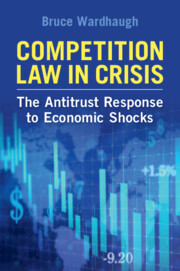Book contents
- Competition Law in Crisis
- Competition Law in Crisis
- Copyright page
- Dedication
- Contents
- Preface
- Acknowledgements
- Table of Authorities
- Introduction
- 1 The Legal Framework
- 2 The Pre–More Economic Approach to Competition’s Role in Crisis Management
- 3 The Post-MEA Relationship between Competition Law and Crisis Management
- 4 The Financial Crisis of 2008
- 5 The Covid-19 Crisis
- 6 Brexit
- 7 The Environment, Sustainability Goals and the Climate Crisis
- Conclusion
- Bibliography
- Index
5 - The Covid-19 Crisis
Published online by Cambridge University Press: 04 August 2022
- Competition Law in Crisis
- Competition Law in Crisis
- Copyright page
- Dedication
- Contents
- Preface
- Acknowledgements
- Table of Authorities
- Introduction
- 1 The Legal Framework
- 2 The Pre–More Economic Approach to Competition’s Role in Crisis Management
- 3 The Post-MEA Relationship between Competition Law and Crisis Management
- 4 The Financial Crisis of 2008
- 5 The Covid-19 Crisis
- 6 Brexit
- 7 The Environment, Sustainability Goals and the Climate Crisis
- Conclusion
- Bibliography
- Index
Summary
The economic disruption resulting from the pandemic has resulted in suggestions from the business community that these rules should be relaxed. As examples, the grocery industry pressed for the competition rules to be relaxed so that major grocery chains could ensure that stores remained open and stocked in the face of staff shortages and supply chain/logistics disruptions. Relaxing the rules, the industry argued, would allow the public to be better served. The chairman of a retail chain criticised the decision to block that firm’s prosed take over of a rival as being ‘absurd’ given the retail conditions, suggesting that that merger rules be relaxed to allow the retail sector to survive. The grocery industry’s pleas were successful: the government relaxed the competition regime applicable to that industry. This chapter analyses the need for these proposals to relax the competition in the economic context surrounding Covid-19. In particular, it argues that even in the context of this disruption, relaxing the competition rules was the wrong response.
- Type
- Chapter
- Information
- Competition Law in CrisisThe Antitrust Response to Economic Shocks, pp. 133 - 162Publisher: Cambridge University PressPrint publication year: 2022

